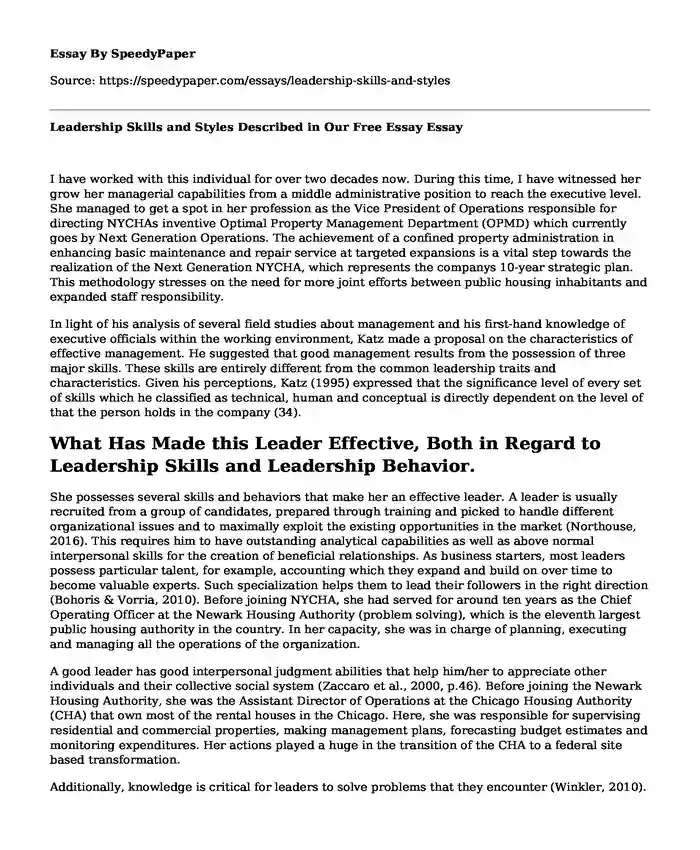
| Type of paper: | Essay |
| Categories: | Management Leadership style Transformational leadership |
| Pages: | 3 |
| Wordcount: | 678 words |
I have worked with this individual for over two decades now. During this time, I have witnessed her grow her managerial capabilities from a middle administrative position to reach the executive level. She managed to get a spot in her profession as the Vice President of Operations responsible for directing NYCHAs inventive Optimal Property Management Department (OPMD) which currently goes by Next Generation Operations. The achievement of a confined property administration in enhancing basic maintenance and repair service at targeted expansions is a vital step towards the realization of the Next Generation NYCHA, which represents the companys 10-year strategic plan. This methodology stresses on the need for more joint efforts between public housing inhabitants and expanded staff responsibility.
In light of his analysis of several field studies about management and his first-hand knowledge of executive officials within the working environment, Katz made a proposal on the characteristics of effective management. He suggested that good management results from the possession of three major skills. These skills are entirely different from the common leadership traits and characteristics. Given his perceptions, Katz (1995) expressed that the significance level of every set of skills which he classified as technical, human and conceptual is directly dependent on the level of that the person holds in the company (34).
What Has Made this Leader Effective, Both in Regard to Leadership Skills and Leadership Behavior.
She possesses several skills and behaviors that make her an effective leader. A leader is usually recruited from a group of candidates, prepared through training and picked to handle different organizational issues and to maximally exploit the existing opportunities in the market (Northouse, 2016). This requires him to have outstanding analytical capabilities as well as above normal interpersonal skills for the creation of beneficial relationships. As business starters, most leaders possess particular talent, for example, accounting which they expand and build on over time to become valuable experts. Such specialization helps them to lead their followers in the right direction (Bohoris & Vorria, 2010). Before joining NYCHA, she had served for around ten years as the Chief Operating Officer at the Newark Housing Authority (problem solving), which is the eleventh largest public housing authority in the country. In her capacity, she was in charge of planning, executing and managing all the operations of the organization.
A good leader has good interpersonal judgment abilities that help him/her to appreciate other individuals and their collective social system (Zaccaro et al., 2000, p.46). Before joining the Newark Housing Authority, she was the Assistant Director of Operations at the Chicago Housing Authority (CHA) that own most of the rental houses in the Chicago. Here, she was responsible for supervising residential and commercial properties, making management plans, forecasting budget estimates and monitoring expenditures. Her actions played a huge in the transition of the CHA to a federal site based transformation.
Additionally, knowledge is critical for leaders to solve problems that they encounter (Winkler, 2010). It helps a leader to conceptualize issues found in complex systems and provide a solution that leads to the implementation of desired change. Her extensive understanding and ability to bring change will help her to solve housing issues in the urban populations throughout the United States. The skills model cites three competencies of an effective leader: problem-solving abilities, good judgment, and knowledge (Northouse, 2016). However, the skills model does not establish any correlation between effective leadership and the environmental influences. Therefore, the issues that affect urban housing areas such as drugs, overcrowding and gang will not hinder her from being the perfect leader. The skills model, however, recognizes these factors as they can affect how a leader performs.
References
Bohoris G. & Vorria E. (2010). Leadership vs. Management. November 24, 2013. Retrieved from http://www.ep.liu.se/ecp/026/076/ecp0726076.pdf
Katz, R.L. (1955). Skills of an effective administrator. Harvard Business Reviews, 33(1), 33- 42.
Northouse, P. G. (2016). Leadership: Theory and practice (7th ed.). Thousand Oaks: CA: Sage Publications
Winkler, I. (2010). Contemporary leadership theories. Heidelberg: Physica-Verlag.
Zaccaro, S.J., Mumford, M.D. Connelly, M.S., Marks, M.A., & Gilbert, J.A. (2000). Assessment of Leader problem-solving capabilities, Leadership Quarterly, 11 (1), 37-64.
Cite this page
Leadership Skills and Styles Described in Our Free Essay. (2019, Oct 28). Retrieved from https://speedypaper.com/essays/leadership-skills-and-styles
Request Removal
If you are the original author of this essay and no longer wish to have it published on the SpeedyPaper website, please click below to request its removal:
- GMO Foods, Essay Example for Free Use
- Intermediate Sanction Essay Example
- American History Essay Example: Illinois Territory, Non-importation Act
- Frankenstein by Mary Shelley, Literary Essay Sample
- Free Paper for Everyone: Reading Journal of the Story Yellow Wallpaper
- Essay Sample Answering Some Questions about Schooling
- Essay Sample: Targeting the Premium Dog Market
Popular categories




